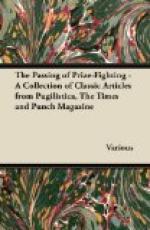* * * * *
[Illustration: Mr. J.L. “Walker” Toole and “Full Company.”]
“NOTES AND PAPER.”—There is a lot of “paper” about from “Walker—London.” No, Mr. JOHNNIE TOOLE, Sir, not your “paper,” for your House is crammed and your “paper” is at a premium. But this particular WALKER, of Warwick House, London, sends forth “Society Stationery”—“which,” as Mrs. Gamp would have said, “spelling of it with an ‘a’ instead of an ‘e,’ Society never is.” Among the lot there’s an “Antique Society Paper,” which should be a Society Paper as old as the world itself, or it might be used by a Fossilised Fogey Club. WALKER & Co.’s new “Society Paper,” whether antique or modern, is pretty and quite harmless—till pen and ink are at work on it; and then—but that’s another story.
* * * * *
COSTS AS THEY ARE AND WILL BE.
(TWO SCENES FROM A FARCICAL TRAGEDY SHOWING THAT SOME OF THE JUDGES’ RECOMMENDATIONS MIGHT BE ADOPTED IMMEDIATELY.)
THE PRESENT (AS THEY ARE). SCENE—SOLICITOR’S PRIVATE ROOM. SOLICITOR AWAITING WEALTHY CLIENT. CLERK IN ATTENDANCE.
Solicitor. The lady is to be shown in the moment she arrives; and mind, I am not to be disturbed as long as she is here.
Clerk. Yes, Sir. [Exit.
Sol. Quite pleasant way of spending a morning. (Enter Client.) Ah, my dear lady, and how are you?
Client. Very well, thank you; but BOBBY is not so well, and as for MARY—
[Enters into long domestic details.
Sol. (in a sympathetic tone). Dear me! And what has given me the pleasure of seeing you here to-day?
Client. I only looked in to ask you how you thought our suit was going on?
Sol. Oh, capitally! You know, we have had several appointments before the Chief Clerk in Chambers, and—
[Enters into long explanation,
bristling with
technicalities.




